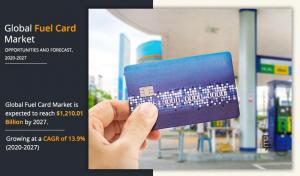Fuel Cards Market Dynamics: Opportunities and Challenge | At a CAGR of 13.9% from 2020 to 2027.
Fuel Cards Market Dynamics: Opportunities and Challenge | At a CAGR of 13.9% from 2020 to 2027.
PORTLAND, UNITED STATES, UNITED STATES, September 21, 2023/EINPresswire.com/ -- Fuel cards were a prevalent financial tool used by individuals and businesses to manage and control fuel-related expenses. These cards are typically issued by banks, fuel companies, or specialized providers and offer various benefits related to fuel purchases.
According to the report published by Allied Market Research, the global fuel cards market was pegged at $672.84 billion in 2019 and is anticipated to reach $1,210.01 billion by 2027, registering a CAGR of 13.9% from 2020 to 2027. The report provides an in-depth analysis of the top investment pockets, top winning strategies, drivers & opportunities, market size & estimations, competitive scenario, and varying market trends.
The rise in need for improved fuel management, increasing penetration of digital transaction solutions, and highly efficient fleet administration with the help of enhanced data capture are the major factors fueling the growth of the global fuel card market. On the other hand, the lack of security measures impedes growth to some extent. However, a surge in demand for fuel cards from developing countries and the integration of telematics with the system is anticipated to create multiple opportunities in the industry.
Based on application, the fuel refill segment contributed to nearly half of the total market revenue in 2019 and is anticipated to rule the roost till 2027. At the same time, the toll segment would manifest the fastest CAGR of 15.6% by 2027.
By geography, Europe held the major share in 2019, generating nearly two-fifths of the global market. Simultaneously, Asia-Pacific is expected to grow at the fastest CAGR of 16.1% during the study period. The other two regions covered in the report include LAMEA and North America.
The key market players analyzed in the global fuel cards market industry report include Engen, ExxonMobil, First National Bank, Royal Dutch Shell, U.S. Bancorp, Wex Inc., FleetCor, British Petroleum, Puma Energy, and Oilibya. These market players have embraced several strategies including partnership, expansion, collaboration, joint ventures, and others to prove their flair in the industry.
Key aspects of the fuel cards market include:
Payment Convenience: Fuel cards offer a convenient way for businesses and individuals to pay for fuel and related expenses. They eliminate the need for cash and provide a more secure and traceable payment method.
Expense Tracking: Many fuel card programs offer features for tracking and managing expenses related to vehicle operations. This can include detailed reporting on fuel consumption, maintenance costs, and driver expenditures.
Inquiry before Buying: https://www.alliedmarketresearch.com/purchase-enquiry/2969
Discounts and Rewards: Some fuel card programs provide discounts or rewards for fuel purchases made with their cards. These incentives can vary widely and may include cashback, discounts on fuel prices, or loyalty points.
Fuel Card Providers: Fuel card programs are typically offered by financial institutions (banks), fuel companies (oil companies or gas station chains), and specialized fleet card providers. Each provider may have its own unique features and benefits.
Market Segmentation: The fuel cards market can be segmented into various categories, including consumer fuel cards for individual drivers, business fuel cards for companies with a fleet of vehicles, and specialized cards for specific industries like trucking or logistics.
Global Presence: The fuel card market is global, with offerings available in many countries. Providers often partner with fuel stations and merchants worldwide to ensure cardholders have access to fuel and services wherever they travel.
Technological Advancements: The market has seen technological advancements, including the integration of fuel cards with telematics systems and mobile apps. These technologies provide real-time tracking and reporting capabilities for fleet management.
Regulatory Compliance: Fuel card providers must often comply with regulatory requirements related to financial transactions and data security, especially when dealing with sensitive information like cardholder data.
Competition: The fuel cards market is competitive, with various providers vying for market share. To attract customers, providers may offer competitive pricing, rewards programs, and additional services.
Environmental Initiatives: Some fuel card programs emphasize environmentally friendly options, such as offering rewards for using biofuels or electric vehicle charging.
Trending Reports in the BFSI Industry
Italy B2B2C Insurance Market: https://www.alliedmarketresearch.com/italy-b2b2c-insurance-market-A31484
Reinsurance Market: https://www.alliedmarketresearch.com/reinsurance-market-A06288
Management Consulting Services Market: https://www.alliedmarketresearch.com/management-consulting-services-market-A19875
Medical Professional Liability Insurance Market: https://www.alliedmarketresearch.com/medical-professional-liability-insurance-market-A30183
Real-Time Payments Market: https://www.alliedmarketresearch.com/real-time-payments-market-A19437
Saudi Arabia Microfinance Market: https://www.alliedmarketresearch.com/saudi-arabia-microfinance-market-A31026
Allied Market Research
Allied Market Research
+ +1 800-792-5285
email us here
Visit us on social media:
Facebook
Twitter
LinkedIn
Legal Disclaimer:
EIN Presswire provides this news content "as is" without warranty of any kind. We do not accept any responsibility or liability for the accuracy, content, images, videos, licenses, completeness, legality, or reliability of the information contained in this article. If you have any complaints or copyright issues related to this article, kindly contact the author above.

